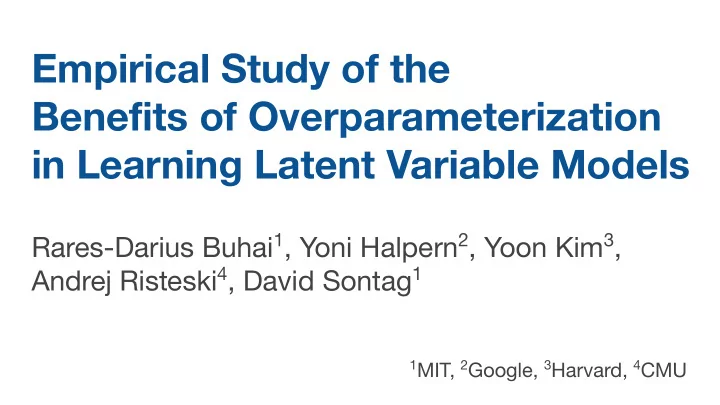

Empirical Study of the Benefits of Overparameterization in Learning Latent Variable Models Rares-Darius Buhai 1 , Yoni Halpern 2 , Yoon Kim 3 , Andrej Risteski 4 , David Sontag 1 1 MIT, 2 Google, 3 Harvard, 4 CMU
Overparameterization = training a larger model than necessary Supervised learning: easier optimization, often without sacrificing generalization . → practice: [Zhang et al., 2016] commonly used neural networks are so large that they can learn randomized labels. → theory: [Allen-Zhu et al., 2018; Allen-Zhu et al., 2019] overparameterized neural networks provably learn and generalize for certain classes of functions.
Overparameterization in unsupervised learning Task: learning latent variable models . Contribution: Empirical study of the benefits of overparameterization in learning latent variable models.
Latent variable models Know . Task: learn . unobserved observed Maximum likelihood: . Typically intractable . Iterative algorithms (e.g., EM, variational learning). inference (typically gradient step) inferred observed unobserved observed
Our setting Ground truth model. latent variables (synthetic setting) observed variables Task: learn model from samples. non-overparameterized overparameterized
Our question A ground truth latent variable is recovered if there exists a learned latent variable with the same parameters. How does overparameterization affect the recovery of ground truth latent variables ?
Our finding With overparameterization , the learned model recovers the ground truth latent variables more non-overparameterized often than without overparameterization. The unmatched learned latent variables are typically redundant. Demonstration through extensive experiments with: overparameterized noisy-OR network models ● sparse coding models ● neural PCFG models ●
Noisy-OR networks latent variables 1 1 0 observed variables 1 Example : image model. latent variables observed variables
Noisy-OR networks Train using variational learning . noisy-OR network recognition network (in our experiments: logistic regression and independent Bernoulli) Maximize the evidence lower bound (ELBO), alternating between gradient steps w.r.t and .
Noisy-OR networks: recovery Image model. # recovered % runs true latent full variables recovery # latent variables of # latent variables of learned model learned model
Noisy-OR networks: recovery Harm of extreme overparameterization is minor . Similar trends for held-out log-likelihood.
Noisy-OR networks: unmatched latent variables discarded or duplicates high failure low prior discarded discarded Simple filtering step to recover ground truth: eliminate latent variables with low prior or high failure ● eliminate latent variables that are duplicates ●
Noisy-OR networks: algorithm variations Overparameterization remains beneficial: batch size : 20 → 1000 ● recognition network : logistic regression → independent Bernoulli ● Suggests benefits are general when learning latent variable models with iterative algorithms.
Noisy-OR networks: explanation Hypothesis With overparameterization, more latent variables initialized close to ground truth latent variables . Then, the benefit is due to a “ warm start ”. Actual finding Latent variables do not converge quickly to ground truth latent variables. In the beginning, undecided . Throughout, contentions .
Noisy-OR networks: optimization stability State of latent variables after 1/9, 2/9, and 3/9 of the first epoch. both contend for the same ground truth latent variable In the beginning, many latent variables are undecided .
Noisy-OR networks: optimization stability State of latent variables after 10, 20, and 30 epochs. both contend for the same ground truth latent variable Throughout, latent variables often contend .
Sparse Coding Neural PCFG Linear model. Nonlinear model. Synthetic experiments. Semi-synthetic experiments with neural network parameterization. Training with linear alternating Training with EM and neural network minimization algorithm. parameterization. → overparameterization gives → overparameterization gives better recovery better recovery (similarity between parse trees) → simple filtering step
Discussion Why is any of this surprising? Typically, smaller models are more likely to be identifiable. However, our experiments show that larger models often make optimization easier and have an inductive bias toward ground truth recovery .
Application For practice : it is helpful to overparameterize. For theory : interesting phenomenon, may provide insights into learning and optimization.
Future work Study larger and more complex models , e.g., commonly used deep generative models. Understand model identifiability. ● Define overparameterization. ● Define ground truth recovery ● and design filtering steps.
Thank you! Our code is available at https://github.com/clinicalml/overparam.
Recommend
More recommend